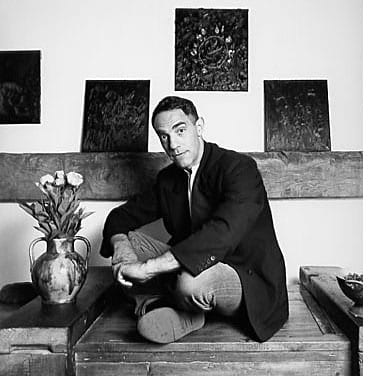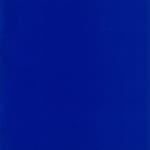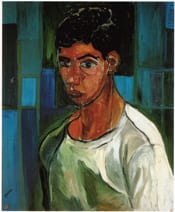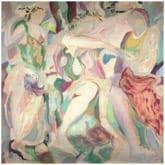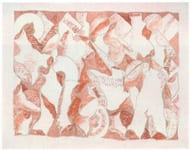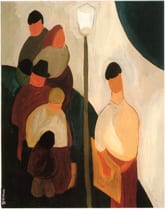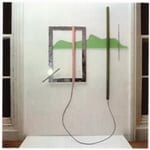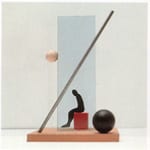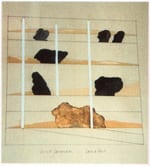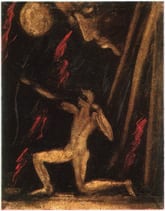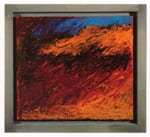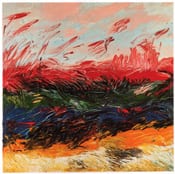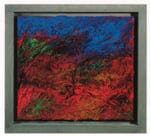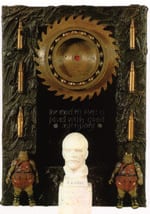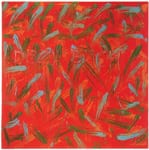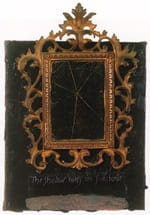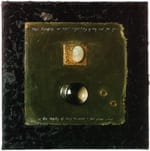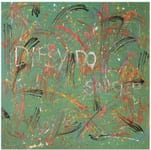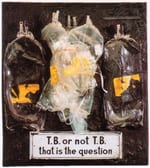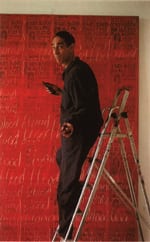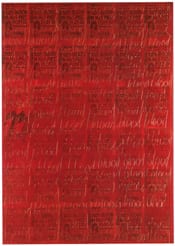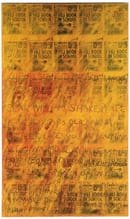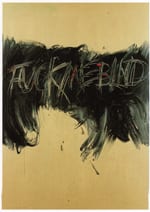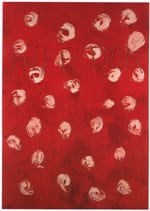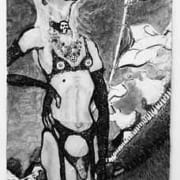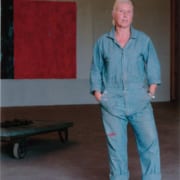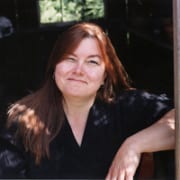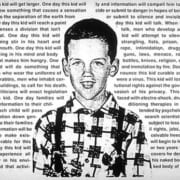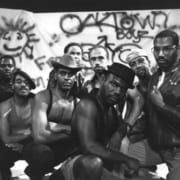Derek Jarman
Derek Jarman (1942-1994)
Biography from Baseline’s Encyclopedia of Film
Born: January 31, 1942, Northwood, England
Died: February 19, 1994, London, England
Leading avant-garde British filmmaker whose visually opulent and stylistically adventurous body of work stands in defiant opposition to the established literary and theatrical traditions of his sometimes staid national cinema. With influences ranging from the eccentric writing-directing team Michael Powell and Emeric Pressburger to seminal gay aesthetes Jean Cocteau and Kenneth Anger, Jarman advocated a personal cinema more dedicated to striking imagery and evocative sounds than to the imperatives of narrative and characterization. His comments on one of his strongest films are revealing: The Last of England works with image and sound, a language which is nearer to poetry than prose. It tells its story quite happily in silent images, in contrast to a word-bound cinema.”
Like the noted American underground filmmaker Anger, Jarman displayed a fascination with violence, homoeroticism, gay representation and mythopoeic imagery. Proudly and openly gay, Jarman shared news of his HIV infection with his public and incorporated his subsequent battles with AIDS into his work, particularly in The Garden (1990) and Blue (1993). Excavating and reclaiming suppressed gay history was an ongoing project that informed his several unconventional biopics: SEBASTIANE (1975), Jarman’s sun-drenched directorial debut about the martyred Christian saint; the unusually accessible and slyly anachronistic Caravaggio (1986); the raw and angry modern dress version of Christopher Marlowe’s Edward II (1991); and the stark and theatrical Wittgenstein (1993).
Trained in the fine arts, Jarman began as (and remained) a designer of sets and costumes for ballet and opera. He made his first films (super-8 shorts) while working as a set designer on Ken Russell’s THE DEVILS (1971) and SAVAGE MESSIAH (1972). He continued to paint and exhibit his work at London galleries while making his own films, which also reflected a painterly concern with composition. Jarman’s features, shorts and music videos display an artist’s lively interest in contemporary and historical English culture. In JUBILEE (1978), Queen Elizabeth I is conducted on a tour of a futuristic England in which violence and anarchy hold sway; the film became something of a beacon of the punk movement in the late 1970s. Jarman’s take on THE TEMPEST (1979) was a typically irreverent and somewhat rambling reworking of Shakespeare’s play. The WWI poems of Wilfred Owen, set to the music of Benjamin Britten, shaped War Requiem (1988), a powerful essay on the wastes of wars past while commenting on the modern ravages of AIDS.
Jarman’s feature about the painter Caravaggio was perhaps his most popular film. This stylishly rendered biopic dramatized the conflicts between the artist’s need for patronage, his religious beliefs and his sexuality. Noting that Caravaggio consistently painted Saint John as muscle-bound, Jarman suggested that the painter found sexual as well as aesthetic elation with the street thug he used as a model. The director also had fun creating filmic facsimiles of some of the painter’s best known works. Curiously, although it undercuts narrative conventions by using heavy-handed anachronisms—typewriters, motorbikes—the film nevertheless reiterated one of the hoariest clichés of Hollywood biopics such as LUST FOR LIFE: i.e., that art is little more than immediately recorded experience, “life” thrown directly onto the canvas; the process of artistic creation is completely glossed over.
Like the celebrated American underground filmmaker Stan Brakhage, Jarman was a compulsive film diarist. He chronicled much of his life on super-8 film and incorporated this footage, blown up to 35mm, into his more personal, non-linear narrative films. Jarman’s super-8 movies of beautiful young men in dramatic landscapes featuring caves, rocks and water lent a lushly romantic mood to THE ANGELIC CONVERSATION (1985), a non-traditional rendering of Shakespeare’s sonnets. Last of England, a raging, despairing, and emotionally overwhelming vision of Britain as an urban wasteland, intercut shots of Jarman writing in his room with excerpts from home movies shot by the director, his father, and his grandfather and surreal tableaux of violence and degradation. Pastoral sequences of Jarman’s childhood evince a longing for simpler times for the filmmaker and the nation. Jarman described himself as one of the last generation to remember “the countryside before mechanization intervened and destroyed everything.”
Though much of Jarman’s work is intensely personal, it was also supremely collaborative. He worked with many of the same people—in front of and behind the camera—on each of his projects. He welcomed and encouraged contributions; significant Liverpool sequences in THE LAST OF ENGLAND were shot by members of Jarman’s crew without his direction. Composer-sound designer Simon Fisher Turner provided powerful scores and/or densely layered soundtracks for CARAVAGGIO, THE LAST OF ENGLAND, THE GARDEN, EDWARD II and BLUE. Distinguished actor Nigel Terry starred as the tortured Caravaggio, and his rich deep voice narrated THE LAST OF ENGLAND and parts of BLUE. Jarman’s most important performer was the prodigiously talented Tilda Swinton, whose intensity and unusual beauty graced THE LAST OF ENGLAND, WAR REQUIEM, THE GARDEN, EDWARD II, WITTGENSTEIN, BLUE and Jarman’s segment of Aria (1988).
In his last years, Jarman was an outspoken advocate for the rights and dignity of gays and PWAs (Persons With AIDS), but art remained his primary cause. A champion of film art and a dedicated experimentalist, he was a critic of, and at odds with, what he saw as the stifling, repressive commercialism of mainstream cinema. Always struggling for funds, Jarman produced his first seven features for a combined cost of only $3 million. His final film, Blue, was his most unconventional—an unchanging field of blue over which we hear voices and sounds. Blind and mortally ill, Jarman remained a visionary film maverick. He authored a number of books, including a 1984 autobiography, Dancing Ledge. Jarman succumbed to AIDS complications at age 52.
Derek Jarman
Books:
1984 Dancing Ledge
1987 The Last Of England (republished as Kicking The Pricks)
1991 Modern Nature
1992 At Your Own Risk
1994 Chroma
1995 Derek Jarman’s Garden
1996 Up In The Air: collected film scripts
2000 Smiling In Slow Motion
Feature Films:
1975 Sebastiane
1977 Jubilee
1979 The Tempest
1986 Caravaggio
1987 The Last of England
1988 War Requiem
1990 The Garden
1991 Edward II
1992 Wittgenstein
1993 Blue
In addition, Derek Jarman produced numerous short films and paintings, worked on pop videos for the Pet Shop Boys, Brian Ferry, Marianne Faifthfull, and The Smiths, and wrote poetry.
Blue (1993)
The screen of this movie remains plain and unchanging during its 72 minutes. Over the blue surface of the screen, the voices of four actors, close friends of the director, the speech of the director himself, the sound effects and the music narrate Derek Jarman’s experience with the AIDS virus, alternating the description of the progress of the virus with deep considerations on poetry, art and life.
The idea of this extraordinary attempt was suggested to Jarman by his loss of sight during the last stages of the illness; he was inspired by the French painter Yves Klein, who eagerly experimented with monochromes. The blue surface represents serenity and contemplation. “Blue” is the last, touching work by Derek Jarman, who succumbed to AIDS some months later. His artistic testament, anyway, is a hymn to life and art: Jarman, mortally ill, does not give up the irony and experiments a radical shift of the limits of sight.
The blue screen is accompanied by Simon Fisher Turner’s poetic music and seductive words, sublimely formulated by the actors Nigel Terry, John Quentin and Tilda Swinton, all of them faithful, long-time collaborators of Jarman’s.
Blue
film by Derek Jarman
Review by Gridley Minima
This “film” (if film it be), the last to be completed by the painter and diarist Jarman before his death early this year of AIDS, is, I’m pretty sure, the best movie I’ve ever seen (if it’s even “seeable”). One hour and seventeen minutes of luminous blue 35mm glow, unchanging, calming, irritating, numbing, and a soundtrack laboriously collaged out of snippets of sound and music and Jarman’s meditations on his encroaching blindness and approaching death, and on the blindness of the world to its own slower but equally inevitable demise.
Jarman, the consummate image-crafter, whose films are quite literally “moving pictures,” coming to grips with the disappearance of all images from his field of vision, then the disappearance of his own self-image into the all-transcending blue of death. Realizing that, on the world’s screen, he has no image; as a queer, an outsider, none of the images he has midwifed into the world will be allowed to have lives of their own and enter the viral give-and-take of autonomous phantasms that is “culture.” So, facing death, he faces not the immediate post-mortem acclaim granted to those who, while unbearably unproductive while alive, were, at least, fertile; but rather the amnesia our society reserves for those whose existence it has never acknowledged in the first place.
“From the bottom of your heart, pray to be released from image.”
But of course, none of this stuff is why I wanted to mention it to you; I brought it up because it struck me, like a bolt out of the blue, as an answer to my prayer in my anti-review of Dracula, six months ago. A cinema that has transcended its own images. Even-tually the effect of the droning blue screen is that you are inside Derek Jarman’s head, seeing what he sees (nothing), hearing what he hears, both outside and inside, and then, when the movie’s over…The one truly human experience, death, communicated, by a master artist transcending the materials and limitations of his own art by facing his own nonexistence, and ours.
The film’s ancestors would be the monochromies of Yves Klein (the color is actually very similar to International Klein Blue), he of the “leap into the void”; it doesn’t take very long before the brain (or the world), like a sponge, soaks up the blue of the screen (the same way it would have fed on the fast food of images, had there been any) and, in the unified blue of the blue world, we attain, as the old Tibetan texts say, the faculty of walking in the sky, if only for this short, magic hour and seventeen minutes of cinematic time.
And so it is that, at the movie’s very end, in the midst of an incredibly lyrical and erotically charged love song, Jarman is strangely reassuring about the world’s blindness. “Our name will be forgotten, in time, no one will remember our work,” he says, as if this is a good thing, because it allows us to concentrate on our love, which is what really matters. Freed from self-conception as artists, queers, or anything else, we are free to become what only death can make us, human, and hence free to realize the true potential of our estate. Beyond words, beyond names, beyond subject and object “In the pandemonium of image, I bring you the universal Blue.”
Blue – Text from a film by Derek Jarman (1942-1994)
You say to the boy open your eyes
When he opens his eyes and sees the light
You make him cry out. Saying
O Blue come forth
O Blue arise
O Blue ascend
O Blue come in
I am sitting with some friends in this cafe drinking coffee served by young refugees from Bosnia. The war rages across the newspapers and through the ruined streets of Sarajevo.
Tania said ‘Your clothes are on back to front and inside out”. Since there were only two of us there I took them off and put them right then and there. I am always here before the doors open.
What need of so much news from abroad while all that concerns either life or death is all transacting and at work within me.
I step off the kerb and a cyclist nearly knocks me down. Flying in from the dark he nearly parted my hair.
I step into a blue funk.
The doctor in St. Bartholomew’s Hospital thought he could detect lesions in my retina – the pupils dilated with belladonna – the torch shone into them with a terrible blinding light.
Look left
Look down
Look up
Look right
Blue flashes in my eyes.
Blue Bottle buzzing
Lazy days
The sky blue butterfly
Sways on the cornflower
Lost in the warmth
Of the blue heat haze
Singing the blues
Quiet and slowly
Blue of my heart
Blue of my dreams
Slow blue love
Of delphinium days
Blue is the universal love in which man bathes – it is the terrestrial paradise.
I’m walking along the beach in a howling gale –
Another year is passing
In the roaring waters
I hear the voices of dead friends
Love is life that lasts forever.
My hearts memory turns to you
David. Howard. Graham. Terry. Paul….
But what if this present
Were the world’s last night
In the setting sun your love fades
Dies in the moonlight
Fails to rise
Thrice denied by cock crow
In the dawn’s first light
Look left
Look down
Look up
Look right
The camera flash
Atomic bright
Photos
The CMV – a green moon then the world turns magenta
My retina
Is a distant planet
A red Mars
From a Boy’s Own comic
With yellow infection
Bubbling at the corner
I said this looks like a planet
The doctor says – “Oh, I think
It looks like a pizza”
The worst of the illness is uncertainty. I’ve played this scenario back and forth each hour of the day for the last six years.
Blue transcends the solemn geography of human limits.
I am home with the blinds drawn
H.B. is back from Newcastle
But gone out – the washing
Machine is roaring away
And the fridge is defrosting
These are his favourite sounds
I’ve been given the option of being an in-patient at the hospital or to coming in twice a day to be hooked to a drip. My vision will never come back.
The retina is destroyed, though when the bleeding stops what is left of my sight might improve. I have to come to terms with sightlessness.
If I loose my sight will my vision be halved?
The virus rages fierce. I have no friends now who are not dead or dying. Like a blue frost it caught them. At work, at the cinema, on marches and beaches. In churches on their knees, running, flying, silent or shouting protest.
It started with sweats in the night and swollen glands. Then the black cancer spread across their faces – as they fought for breath TB and pneumonia hammered their lungs, and Toxo at the brain. Reflexes scrambled – sweat poured through hair matter like lianas in the tropical forest. Voices slurred – and then were lost forever. My pen chased this story across the page tossed this way and that in the storm.
The blood of sensibility is blue
I consecrate myself
To find its most perfect expression
My sight failed a little more in the night
H.B. offers me his blood
It will kill everything he says
The drip of DHPG
Trills like a canary
I am accompanied by a shadow into which H.B. appears and disappears. I have lost the sight on the periphery of my right eye.
I hold out my hands before me and slowly part them. At a certain moment they disappear out of the corner of my eyes. This is how I used to see. Now if I repeat the motion this is all I see.
I shall not win the battle against the virus – in spite of the slogans like “Living with AIDS”. The virus was appropriated by the well – so we have to live with AIDS while they spread the quilt for the moths of Ithaca across the wine dark sea.
Awareness is heightened by this, but something else is lost. A sense of reality drowned in theatre.
Thinking blind, becoming blind.
In the hospital it is as quiet as a tomb. The nurse fights to find a vein in my right arm. We give up after five attempts. Would you faint if someone stuck a needle into your arm? I’ve got used to it – but I still shut my eyes.
The Gautama Buddha instructs me to walk away from illness. But he wasn’t attached to a drip.
Fate is the strongest
Fate Fated Fatal
I resign myself to Fate
Blind Fate
The drip stings
A lump swells up in my arm
Out comes the drip
An electric shock sparks up my arm
How can I walk away with a drip attached to me?
How am I going to walk away from this?
I fill this room with the echo of many voices
Who passed time here
Voices unlocked from the blue of the long dried paint
The sun comes and floods this empty room
I call it my room
My room has welcomed many summers
Embraced laughter and tears
Can it fill itself with your laughter
Each word a sunbeam
Glancing in the light
This is the song of My Room
Blue stretches, yawns and is awake.
There is a photo in the newspaper this morning of refugees leaving Bosnia. They look out of time. Peasant women with scarves and black dresses stepped from the pages of an older Europe. One of them has lost her three children.
Lightning flickers through the hospital window – at the door an elderly woman stands waiting for the rain to clear. I ask her if I can give her a lift, I’ve hailed a taxi. “Can you take me to Holborn tube?” On the way she breaks down in tears. She has come from Edinburgh. Her son is in the ward – he has meningitis and has lost the use of his legs – I’m helpless as the tears flow. I can’t see her. Just the sound of her sobbing.
One know the whole world
Without stirring abroad
Without looking out of the window
One can see the way of heaven
The further one goes
The less one knows
In the pandemonium of image
I present you with the universal Blue
Blue an open door to soul
An infinite possibility
Becoming tangible
Here I am again in the waiting room. Hell on Earth is a waiting room. Here you know you are not in control of yourself, waiting for your name to be called: “712213”. Here you have no name, confidentiality is nameless. Where is 666? Am I sitting opposite him/her? Maybe 666 is the demented woman switching the channels on the TV.
What do I see
Past the gates of conscience
Activists invading Sunday Mass
In the cathedral
An epic Czar Ivan denouncing the
Patriarch of Moscow
A moon-faced boy who spits and repeatedly
Crosses himself – as he genuflects
Will the pearly gates slam shut in
The faces of the devout
The demented woman is discussing needles – there is always a discussion here. She has a line put into her neck.
How are we perceived, if we are to be perceived at all? For the most part we are invisible.
If the doors of perception were cleansed then everything would be seen as it is.
The dog barks, the caravan passes.
Marco Polo stumbles across the Blue Mountain.
Marco Polo stops and sits on a lapis throne by the River Oxus while he is ministered to by the descendants of Alexander the Great. The caravan approaches, blue canvasses fluttering in the wind. Blue people from over the sea – ultramarine – have come to collect the lapis with its flecks of gold.
The road to the city of Aqua Vitae is protected by a labyrinth built from crystals and mirrors which in the sunlight cause terrible blindness. The mirrors reflect each of your betrayals, magnify them and drive you into madness.
Blue walks into the labyrinth. Absolute silence is demanded to all its visitors, so their presence does not disturb the poets who are directing the excavations. Digging can only proceed on the calmest of days as rain and wind destroy the finds.
The archaeology of sound has only just been perfected and the systematic cataloguing of words has until recently been undertaken in a haphazard way. Blue watched as a word or phrase materialised in scintillating sparks, a poetry of fire which casts everything into darkness with the brightness of its reflections.
As a teenager I used to work for the Royal National Institute for the Blind on their Christmas appeal for radios, with dear miss Punch, seventy years old, who used to arrive each morning on her Harley Davidson.
She kept us on our toes. Her job as a gardener gave her time to spare in January. Miss Punch Leather Woman was the first out dyke I ever met. Closeted and frightened by my sexuality she was my hope. “Climb on, let’s go for a ride.” She looked like Edith Piaf, a sparrow, and wore a cock-eyed beret at a saucy angle. She bossed all the other old girls who came back year after year for her company.
In the paper today. Three quarters of the AIDS organisations are not providing safer sex information. One district said they had no queers in their community, but you might try district X – they have a theatre.
My sight seems to have closed in. The hospital is even quieter this morning. Hushed. I have a sinking feeling in my stomach. I feel defeated. My mind bright as a button but my body falling apart – a naked light bulb in a dark and ruined room. There is death in the air here but we are not talking about it. But I know the silence might be broken by distraught visitors screaming, “Help, Sister! Help Nurse!” followed by the sound of feet rushing along the corridor. Then silence.
Blue protects white from innocence
Blue drags black with it
Blue is darkness made visible
Blue protects white from innocence
Blue drags black with it
Blue is darkness made visible
Over the mountains is the shrine to Rita, where all at the end of the line call. Rita is the Saint of the Lost Cause. The saint of all who are at their wit’s end, who are hedged in and trapped by the facts of the world. These facts, detached from cause, trapped the Blue Eyed Boy in a system of unreality. Would all these blurred facts that deceive dissolve in his last breath? For accustomed to believing in image, an absolute idea of value, his world had forgotten the command of essence: Thou Shall Not Create Unto Thyself Any Graven Image, although you know the task is to fill the empty page. From the bottom of your heart, pray to be released from image.
Time is what keeps the light from reaching us.
The image is a prison of the soul, your heredity, your education, your vices and aspirations, your qualities, your psychological world.
I have walked behind the sky.
For what are you seeking?
The fathomless blue of Bliss.
To be an astronaut of the void, leave the comfortable house that imprisons you with reassurance.
Remember,
To be going and to have are not eternal – fight the fear that engenders the beginning, the middle and the end.
For Blue there are no boundaries or solutions.
How did my friends cross the cobalt river, with what did they pay the ferryman? As they set out for the indigo shore under this jet-black sky – some died on their feet with a backward glance. Did they see Death with the hell hounds pulling a dark chariot, bruised blue-black growing dark in the absence of light, did they hear the blast of trumpets?
David ran home panicked on the train from Waterloo, brought back exhausted and unconscious to die that night. Terry who mumbled incoherently into his incontinent tears. Others faded like flowers cut by the scythe of the Blue Bearded Reaper, parched as the waters of life receded. Howard turned slowly to stone, petrified day by day, his mind imprisoned in a concrete fortress until all we could hear were his groans on the telephone circling the globe.
Mad Vincent sits on his yellow chair clasping his knees to his chest – Bananas. The sunflowers wilt in the empty pot, bone dry, skeletal, the black seeds picked into the staring face of a Halloween pumpkin. He is unaware of Blue standing in the corner. Fevered eyes glare at the jaundiced corn, caw of the jet-black crows spiralling in the yellow. The lemon goblin stares from the unwanted canvasses thrown in a corner. Sourpuss suicide screams with evil – clasping cowardly Yellowbelly, slit eyed.
Blue fights diseased Yellowbelly whose fetid breath scorches the trees yellow with ague. Betrayal is the oxygen of his devilry. He’ll stab you in the back. Yellowbelly places a jaundiced kiss in the air, the stink of pubs blinds Blue’s eyes. Evil swims in the yellow bile. Yellowbelly’s snake eyes poison. He crawls over Eve’s rotting apple wasp-like. Quick as a flash he stings Blue in the mouth – “AAAUGH!” – his hellish legion buzz and chuckle in the mustard gas. They’ll piss all over you. Sharp nicotine-stained fangs bared. Blue transformed into an insectocutor, his Blue aura frying the foes.
We all contemplated suicide
We hoped for euthanasia
We were lulled into believing
Morphine dispelled pain
Rather than making it tangible
Like a mad Disney cartoon
Transforming itself into
Every conceivable nightmare
Karl killed himself – how did he do it? I never asked. It seemed incidental. What did it matter if he swigged prussic acid or shot himself in the eye. Maybe he dived into the streets from high up in the cloud lapped skyscrapers.
The nurse explains the implant. You mix the drugs and drip yourself once a day. The drugs are kept in a small fridge they give you. Can you imagine travelling around with that? The metal implant will set the bomb detector off in airports, and I can just see myself travelling to Berlin with a fridge under my arm.
Impatient youths of the sun
Burning with many colours
Flick combs through hair
In bathroom mirrors
Fucking with fusion and fashion
Dance in the beams of emerald lasers
Mating on suburban duvets
Cum splattered nuclear breeders
What a time that was.
The drip ticks out the seconds, the source of a stream along which the minutes flow, to join the river of hours, the sea of years and the timeless ocean.
The side effects of DHPG, the drug for which I have to come into hospital to be dripped twice a day, are: Low white blood cell count, increased risk of infection, low platelet count which may increase the risk of bleeding, low red blood cell count (anaemia), fever, rush, abnormal liver function, chills, swelling of the body (oedema), infections, malaise, irregular heart beat, high blood pressure (hypertension), low blood pressure (hypotension), abnormal thoughts or dreams, loss of balance (ataxia), come, confusion, dizziness, headache, nervousness, damage to nerves (peristhecia), psychosis, sleepiness (somnolence), shaking, nausea, vomiting, loss of appetite (anorexia), diarrhoea, bleeding from the stomach or intestine (intestinal haemorrhage), abdominal pain, increased number of one type of white blood cell, low blood sugar, shortness of breath, hair loss (alopecia), itching (pruritus), hives, blood in the urine, abnormal kidney functions, increased blood urea, redness (inflammation), pain or irritation (phlebitis).
Retinal detachments have been observed in patients both before and after initiation of therapy. The drug has caused decreased sperm production in animals and may cause infertility in humans, and birth defects in animals. Although there is no information in human studies, it should be considered a potential carcinogen since it causes tumours in animals.
If you are concerned about any of the above side-effects or if you would like any further information, please ask your doctor.
In order to be put on the drug you have to sign a piece of paper stating you understand that all these illnesses are a possibility.
I really can’t see what I am to do. I am going to sign it.
The darkness comes in with the tide
The year slips on the calendar
Your kiss flares
A match struck in the night
Flares and dies
My slumber broken
Kiss me again
Kiss me
Kiss me again
And again
Never enough
Greedy lips
Speedwell eyes
Blue skies
A man sits in his wheelchair, his awry, munching through a packet of dry biscuits, slow and deliberate as a praying mantis. He speaks enthusiastically but sometimes incoherently of the hospice. he says, “You can’t be too careful who you mix with there, there’s no way of telling the visitors, patients or staff apart. The staff have nothing to identify them except they are all in leather. The place is like an S&M club”. This hospice has been built by charity, the names of the donors displayed for all to see.
Charity has allowed the uncaring to appear to care and is terrible for those dependent on it. It has become big business as the government shirks its responsibilities in these uncaring times. We go along with this, so the rich and powerful who fucked us over once fuck us over again and get it both ways. We have always been mistreated, so if anyone gives us the slightest sympathy we overreact with our thanks.
I am a mannish
Muff diving
Size queen
With bad attitude
An arse licking
Psychofag
Molesting the flies of privacy
Balling lesbian boys
A perverted heterodemon
Crossing purpose with death
I am a cock sucking
Straight acting
Lesbian man
With ball crushing bad manners
Laddish nymphomaniac politics
Spunky sexist desires
of incestuous inversion and
Incorrect terminology
I am a Not Gay
H.B. is in the kitchen
Greasing his hair
He guards the space
Against me
He calls it his office
At nine we leave for the hospital
H.B. comes back from the eye dept
Where all my notes are muddled
He says
It’s like Romania in there
Two light bulbs
Grimly illuminate
The flaking walls
There is a box of dolls
In the corner
Indescribably grim
The doctor says
Well of course
The kids don’t see them
There are no resources
To brighten the place up
My eyes sting from the drops
The infection has halted
The flash leaves
Scarlet after image
Of the blood vessels in my eye
Teeth chattering February
Cold as death
Pushes at the bedsheets
An aching cold
Interminable as marble
My mind
Frosted with drugs ices up
A drift of empty snowflakes
Whiting out memory
A blinkered twister
Circling in spirals
Cross-eyed meddlesome consciousness
Shall I? Will I?
Doodling death watch
Mind how you go
Oral DHPG is consumed by the liver, so they have tweaked a molecule to fool the system. What risk is there? If I had to live forty years blind, I might think twice. Treat my illness like the dodgems: music, bright lights, bumps and throw yourself into life again.
The pills are the most difficult, some taste bitter, others are too large. I’m taking about thirty a day, a walking chemical laboratory. I gag on them as I swallow them and they come up half dissolved in the coughing and the spluttering.
My skins sits on me like the shirt of Nessus. My face irritates, as do my back and legs at night. I toss and turn, scratching, unable to sleep. I get up, turn on the light. Stagger to the bathroom. If I become so tired, maybe I’ll sleep. Films chase through my mind. Once in a while I dream a dream as magnificent as the Taj Mahal. I cross southern India with a young spirit guide – India the land of my dreaming childhood. The souvenirs in Moslem’s peach and grey living room. Granny called Moselle, called ‘Girly’, called May. An orphan who lost her name, which was Ruben. jade, monkeys, ivory miniatures, mah-jongg. The winds and bamboos of China.
All the old taboos of
Blood lines and blood banks
Blue blood and bad blood
Our blood and your blood
I sit here – you sit there
As I slept a jet slammed into a tower block. The jet was almost empty but two hundred people were fried in their sleep.
The earth is dying and we do not notice it.
A young man frail as Belsen
Walks slowly down the corridor
His pale green hospital pyjamas
Hanging off him
It’s very quiet
Just the distant coughing
My jugs eye blots out the
Young man who has just walked past
My field of vision
This illness knocks you for six
Just as you start to forget it
A bullet in the back of my head
Might be easier
You know, you can take longer than
The second world war to get to the grave.
Ages and Aeons quit the room
Exploding into timelessness
No entrances or exits now
No need for obituaries or final judgements
We knew that time would end
After tomorrow at sunrise
We scrubbed the floors
And did the washing up
It would not catch us unawares
The white flashes you are experiencing in your eyes are common when the retina is damaged.
The damaged retina has started to peel away leaving the innumerable black floaters, like a flock of starlings around in the twilight.
I am back at St Mary’s to have my eyes looked at by the specialist. The place is the same, but there is new staff. How relieved I am not to have the operation this morning to have a tap put into my chest. I must try and cheer up H.B. as he has had a hell of a fortnight. In the waiting room a little grey man over the way is fretting as he has to get to Sussex. He says, “I am going blind, I cannot read any longer”.
A little later he picks up a newspaper, struggles with it for a moment and throws it back on the table. My stinging eye-drops have stopped me reading, so I write this in a haze of belladonna. The little grey man’s face has fallen into tragedy. He looks like Jean Cocteau without the poet’s refined arrogance. The room is full of men and women squinting into the dark in different states of illness. Some barely able to walk, distress and anger on every face and then a terrible resignation.
Jean Cocteau takes off his glasses, he looks about him with an undescribable meanness. He has black slip-on shoes, blue socks, grey trousers, a Fairisle sweater and a herringbone jacket. The posters that plaster the walls above him have endless question marks, HIV/AIDS?, AIDS?, HIV?, ARE YOU INFECTED BY HIV/AIDS?,ARC?, HIV? This is a hard wait. The shattering bright light of the eye specialist’s camera leaves that empty sky blue after-image. Did I really see green the first time? The after-image dissolves in a second. As the photographs progress, colours change to pink and the light turns to orange. The process is a torture, but the result, stable eyesight, worth the price and the twelve pills I have to take a day. Sometimes looking at them I fell nauseous and want to skip them. It must be my association with H.B., lover of the computer and king of the keyboard that brought my luck on the computer which chose my name for this drug trial. I nearly forgot as I left St Mary’s I smiled at Jean Cocteau. He gave a sweet smile back.
I caught myself looking at shoes in a shop window. I thought of going in and buying a pair, but stopped myself. The shoes I am wearing at the moment should be sufficient to walk me out of life.
Pearl fishers
In azure seas
Deep waters
Washing the isle of the dead
In coral harbours
Amphora
Spill
Gold
Across the still seabed
We lie there
Fanned by the billowing
Sails of forgotten ships
Tossed by the mournful winds
Of the deep
Lost Boys
Sleep forever
In a dear embrace
Salt lips touching
In submarine gardens
Cool marble fingers
Touch an antique smile
Shell sounds
Whisper
Deep love drifting on the tide forever
The smell of him
Dead good looking
In beauty’s summer
His blue jeans
Around his ankles
Bliss in my ghostly eye
Kiss me
On the lips
On the eyes
Our name will be forgotten
In time
No one will remember our work
Our life will pass like the traces of a cloud
And be scattered like
Mist that is chased by the
Rays of the sun
For our time is the passing of a shadow
And our lives will run like
Sparks through the stubble.
I place a delphinium, Blue, upon your grave
“Blue” is Copyright 1993 The Estate of Derek Jarman.
Gallery One – Early Work
Gallery Two

